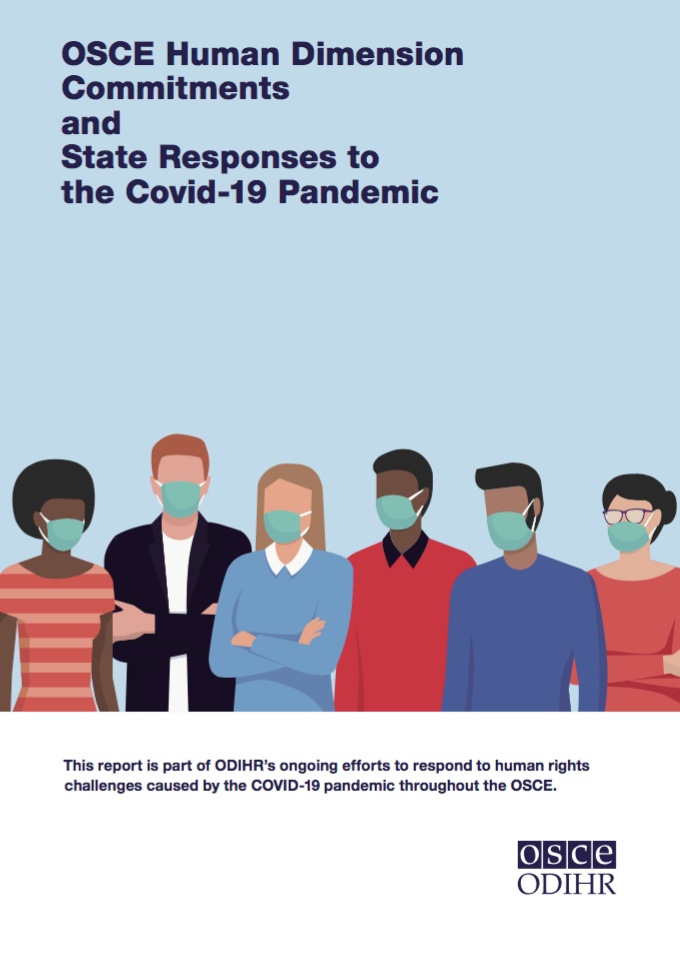The OSCE was established to strengthen human security across the Northern Hemisphere during a time of global transformation. Its 57 countries now number more than 1.2 billion people. Policies and practices developed and applied here have global significance.
The OSCE Office for Democratic Institutions and Human Rights (ODIHR)—which is the OSCE’s principal human rights institution—provides support, assistance and expertise to participating States and civil society on how to promote and protect human rights, including freedom of religion or belief.
As the COVID-19 pandemic unsettled the world, causing immense upheaval, the majority of states across the OSCE region declared various kinds of emergency regimes.
The Office found it important to detail the impact of these emergency measures on the protection of human rights. The report on OSCE Human Dimension Commitments and State Responses to the Covid-19 Pandemic analyzes the ramifications of the pandemic for the enjoyment of the universal human right to freedom of religion or belief, which is one of the fundamental principles guiding mutual relations among OSCE participating States and an integral aspect of the OSCE’s concept of security.
Challenges and opportunities
According to the ODIHR report, during the early stages of the crisis, against a backdrop of great stress and anxiety, individuals and communities found themselves temporarily unable to access places of worship, observe religious holidays, participate in religious rituals, gather in homes for worship, and partake in activities of an educational nature. Physical distancing has also hampered the efforts of religious or belief communities to undertake charitable and humanitarian work.

Photo credit: OSCE
Many communities have adapted swiftly, continuing their operations in innovative ways. Rapid digitization has often provided platforms that were more immediate and intimate and, in some cases, helped to lower barriers to the exercise of freedom of religion or belief. This trend, however, has also opened the possibility for increased surveillance, monitoring and the collection of digital footprints for profiling purposes.
Unfortunately pre-existing social hostilities based on religion or belief became more acute. Certain communities were blamed for the spread of the virus and a discernable upsurge in incitement to hostility or violence, conspiracy theories and scapegoating heightened a sense of insecurity among them.
While most religious or belief communities have complied with the public health directives from their governments, some elected to challenge the existing guidelines on social distancing or insisted that religious services and activities continue in person. Such acts of defiance resulted in wide publicity, arrests of religious leaders, and further social tensions and unrest.
Certain religious or belief communities, organizations, leaders and actors played a notably strategic rolein the crisis by offering messages of solidarity and hope, countering misinformation, supporting health services and assisting the most vulnerable members of our societies.
Finally, despite the lockdown, in a few participating States law enforcement officials raided the homes of individuals belonging to non-registered religious or belief communities and additional concerns about the health and safety conditions of those currently in detention came to surface.
Good practices
As the pandemic progressed, a number of good practices emerged. These included careful legal assessment of initial bans on public worship and increased co-operation between state authorities and religious or belief communities. Blanket bans on meetings in places of worship were considered excessive or disproportionate.
In some states, governments have engaged in constructive dialogue and collaboration with religious leaders and actors to ensure an evidence- and science-based and gender-sensitive policy response to the pandemic.
Concluding observations
Understanding the multivariate nature of all of these trends and learning lessons from them will ultimately help governments develop better responses, policies and laws in the future.
As ODIHR highlighted, government leaders should respond to the manifold challenges by establishing permanent channels of communication to build trust with representatives of different religious or belief communities; speaking out against any forms of incitement to discrimination, hostility or violence and promoting a counter-narrative of hope and inclusion; and harnessing digital technologies for outreach and dialogue while ensuring privacy protection.
Overall, ODIHR discerned the reinforced need for international collaboration and the centrality of the respect for human rights to the lasting stability of our societies as major lessons from the Covid-19 pandemic. It now continues to find innovative solutions to exercise its mandate and provide assistance and expertise to governments and civil society across the region in their quest to advance the right to freedom or religion or belief for all while ensuring genuine security.
Mikolaj Wrzecionkowski is ODIHR’s acting Senior Adviser on Freedom of Religion or Belief. His views may not reflect ODIHR policy.